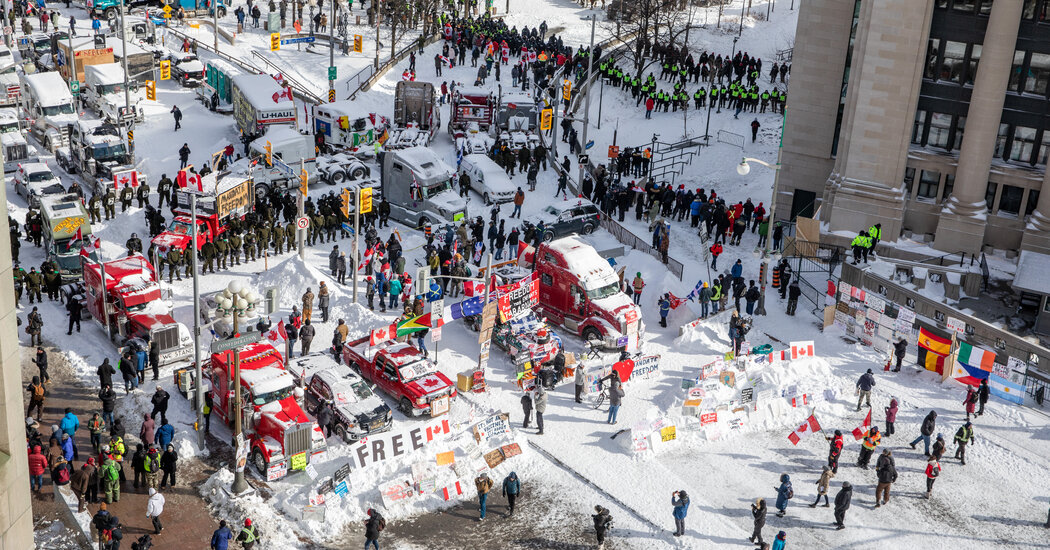As a court denied bail to one arrested protest organizer, banks have locked up hundreds of accounts linked to others under an emergency order invoked by the government.
OTTAWA — With the capital’s streets cleared of the heavy trucks and cars that made some of them impassable for three long weeks of protest, the Canadian authorities are turning their scrutiny to the finances of those behind the chaos.
The protesters may have been routed, Michael Duheme, the deputy commissioner of the Royal Canadian Mounted Police for federal policing, told reporters after Ottawa’s streets were reclaimed over the weekend, but the police need to “continue to choke off financial support.”
When Prime Minister Justin Trudeau decided a week ago to invoke his country’s Emergencies Act for the first time in Canadian history to quell the unrest, it gave the police sweeping new powers to go after the finances of the protesters. Some may now face long-term consequences.
But for one protest organizer who was arrested last week, the effect was more immediate.
Appearing before a judge on Tuesday, the organizer, Tamara Lich, told the court she had been frozen out of all of her accounts and could not come up with the 5,000 Canadian dollar surety requested by prosecutors.
The issue may have been moot: The court denied bail.
Justice Julie Bourgeois said she was not convinced that if freed, Ms. Lich would leave Ottawa or stop encouraging others to keep blocking roads. “You have had plenty of opportunity to remove yourself and even others from this criminal activity,” she said, “but obstinately chose not to and persistently counseled others not to either.”
Justice Bourgeois noted that Ms. Lich likely faces a “lengthy” sentence if convicted.
About the time the bail hearing was taking place, lawmakers in the Canadian Senate began debate over Mr. Trudeau’s Emergencies Act order. The evening earlier, overcoming opposition from Conservative members of Parliament, Mr. Trudeau persuaded the House of Commons to endorse his decision.
Since the declaration was made, the police have been turning over the names of organizers and people who actively blocked Ottawa’s roads with their trucks and other vehicles during the blockade, which was set off by opposition to the government’s pandemic restrictions.
As of Sunday, the national police force said in a statement, 219 “financial products” had been frozen, 253 Bitcoin addresses related to protesters and organizers had been given to virtual currency exchange operators, and a bank had frozen 3.8 million Canadian dollars held by a payment processor.
Ms. Lich, who is from Alberta, was the driving force behind a GoFundMe campaign that raised more than 10 million Canadian dollars for the protest. About one million dollars was turned over to her before the crowdfunding site shut down the campaign. The authorities charged Ms. Lich on Thursday with counseling to commit mischief, a serious offense under Canadian criminal law.
All of the accounts that have been frozen will remain so for up to 30 days from Feb. 14, the date of the national emergency declaration. But the government could extend or shorten that period.
Leah West, a professor specializing in national security law at Carleton University in Ottawa, said it may be possible that other actions will be taken to seize funds. Regardless, she said, there will most likely be lasting effects for the protesters and organizers when it comes to their finances.
Understand the Trucker Protests in Canada
Voicing grievances. A demonstration by truck drivers protesting vaccine mandates has ballooned into a nationwide movement that has slowed the economy and brought life to a standstill in parts of Canada. Here’s what to know:
“Down the road,” Professor West said, “banks may decide that these are not people they want to provide financial services to because they’ve engaged in illegal activity. Would someone want to give you a mortgage if you used your house to deal drugs? Probably not.”
In the face of the large-scale police operation that began clearing the streets on Friday, many of the protesters drove away to avoid being arrested and having their vehicles seized. By Monday morning, the police had arrested 196 people and accused them of either organizing the blockade or participating in it, and towed 115 vehicles. In the initial days of the protest, there were more than 400 vehicles occupying downtown streets.
Some of the protesters did not go very far.
After leaving the streets of the capital, one small group set up a new camp Sunday across from a truck stop on the Trans-Canada highway about 100 kilometers east of Ottawa. As participants were busy setting up food canteens and arranging firewood stockpiles, a leader who would only be identified as Eric declined to discuss their plans.
Mr. Trudeau told the House of Commons that there were two other small groups outside the city.
Ottawa’s acting police chief, Steve Bell, said last week that the police would continue to work “for months” to track down protest participants.
“If you are involved in this protest, we will actively look to identify you and follow up with financial sanctions and criminal charges,” Chief Bell said.
Vjosa Isai contributed reporting from Toronto.


























